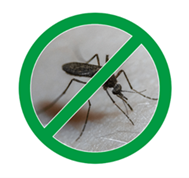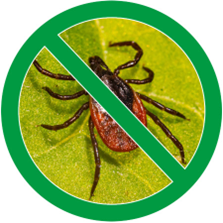Mosquito & Tick Season

This year, mosquitoes are problematic again due to increased moisture, which provides more breeding grounds for mosquito larvae that thrive in stagnant water. To prevent mosquito-borne diseases, it’s crucial to stop larvae from developing into adults. While completely eliminating mosquitoes is impossible, our control strategy involves spraying pesticides on underbrush, foliage, grass, and low-lying trees. This treatment kills mosquitoes at all stages of development and prevents them from inhabiting these areas.
For optimal results, begin treatments early in the summer and reapply as necessary throughout the season, especially after heavy rains, which might wash away the insecticide.
Protect yourself from mosquitoes by:

- Wear long sleeves and pants, and keep in mind they are most active at dawn and dusk.
- Use repellants when traveling in the woods or damp locations.
- Remove all standing water (flowerpots, buckets, birdbaths, gutters, etc.)
- Keep your grass cut short.
- Plant flowers and herbs such as lemongrass, marigolds, garlic, lavender, rosemary, basil, mint, sage, catnip, bee balm, and scented geraniums.
Contact Northern Pest to Schedule a Mosquito Treatment
General Tick Information
Tick season is bad this year, particularly due to a combination of factors. A mild winter across many regions allowed ticks to thrive and emerge earlier than usual. Additionally, an increase in mice populations has led to a boom in ticks, as more hosts are available for them to feed on. The convergence of these two aspects creates a perfect environment for ticks to thrive.
Ticks prefer to live in warm and humid areas (hence why a Michigan summer is perfect for them), particularly in long grass in the shade or by standing water. Common indications of tick bites are rashes and swelling around the bite, a burning sensation, and small blisters. Symptoms of tick bites might last a few weeks, but they have been known to carry Lyme Disease (among some other less common diseases), so it is best to get a bite looked at by a professional if you have any concerns.
Protect yourself from ticks by:

- Wear clothing covering your arms and legs if walking through woods or areas with long grass.
- Apply tick repellents on yourself or your animals.
- Regularly inspect your clothing, arms, legs, and scalp for ticks after being in these areas.
- To promptly remove ticks, use fine-tipped tweezers to grasp the tick as close to the skin as possible. Pull upward with steady, even pressure. Afterward, thoroughly clean the area with rubbing alcohol, an iodine scrub, or soap and water.
- To kill any ticks on your clothing, put them in the dryer on high heat for 10 minutes before washing them.
- Treat your yard for ticks, especially if it borders woods or water. Keep your yard well-trimmed and remove leaf litter where ticks may hide.
Contact Northern Pest to Schedule a Tick Treatment
Northern Pest is fully licensed and insured, and we look forward to serving you! From Home, the Lake, Camp, or Your Business –Northern Pest Has You Covered!
Northern Pest: Our family serving yours! We are licensed and insured to provide insect and wildlife pest control. Our crew has the expertise to track wildlife entry points and remove pests of all kinds, including our licensed builders, who can make any of the necessary repairs caused by wildlife. Northern Pest is a member of the MDAT and the NWCOA. We are certified by the IICRC to offer professional mold mitigation services caused by animal damage. At Northern Pest, we do it all!
Written by the digital marketing team at Creative Programs & Systems: www.cpsmi.com